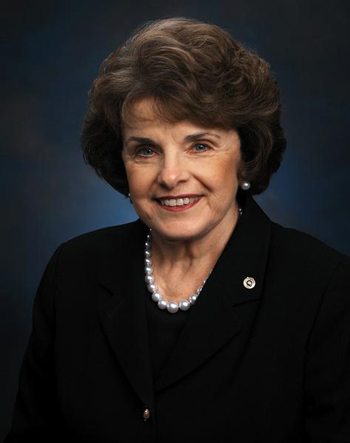November 21, 2019 - Washington - Fifty-seven leading survivor advocacy organizations endorsed S.2843, the Violence Against Women Reauthorization Act, a bill introduced by Senator Dianne Feinstein  (D-Calif.) last week and cosponsored by all 47 Democrats. Her bill is the Senate companion to a bill passed by the House of Representatives in April.
(D-Calif.) last week and cosponsored by all 47 Democrats. Her bill is the Senate companion to a bill passed by the House of Representatives in April.
The full list of supporters can be found here.
The bill reauthorizes VAWA through 2024, preserves advancements made in previous reauthorizations and includes a number of additional improvements to the current law.
“The broad support for our bill shows this isn’t a Democratic or Republican bill, it’s a survivors’ bill,” said Senator Feinstein. “The people on the frontlines understand what improvements are needed to prevent violence and help survivors recover. I encourage my Senate colleagues to listen to these advocates and help us pass a bipartisan VAWA reauthorization that includes important enhancements that these organizations are asking for.”
“The companion bill introduced by Senator Feinstein is rooted in survivors’ safety needs and their access to justice,” said Cindy Southworth, interim CEO and executive vice president at the National Network To End Domestic Violence. “Additionally, it will invest prevention efforts that will help change the course for future generations. We urge each senator: listen to the voices of survivors and support the provisions of this bill.”
“Survivors have been holding their breath waiting for VAWA to pass,” said Alejandra Y. Castillo, CEO of YWCA USA. “Based on the bipartisan bill that passed the House of Representatives this spring, this bill addresses the priorities of the women, children, and other survivors who rely on YWCA for consistent, high-quality wrap around services in order to recover, thrive, and feel safe. More than 57 YWCAs in 27 states have received funding and support from VAWA since it was last authorized to prevent and respond to domestic violence, sexual assault, dating violence, and stalking. We urge the Senate to advance this legislation quickly, so that survivors can be assured of critical safety services, and YWCAs and their local partners can continue their life-saving work in communities across the country.”
“The Violence Against Women Act, known as VAWA, is one of the cornerstones of the federal government’s response to domestic and dating violence, sexual assault and stalking,” said Ruth M. Glenn, president and CEO of the National Coalition Against Domestic Abuse. “VAWA has been unauthorized since February, and the time to reauthorize with the enhancements contained in Senator Feinstein’s bill is overdue. S.2843 is based on extensive outreach to advocates and survivors and includes vital improvements that are needed to protect survivors’ safety and lives, provides them with a path to healing and holds perpetrators accountable.”
Key provisions in the bill:
- Protects Native American women by improving tribal access to federal crime information databases and reaffirming tribal criminal jurisdiction over non-Indian perpetrators of domestic violence, sexual assault, dating violence and stalking for all federally recognized Indian tribes and Alaskan Natives.
- Explicitly states that grant recipients are allowed to train staff and others on identifying and stopping discrimination against LGBT individuals. Service providers currently remain uncertain about whether they can use grants to train for this.
- Reauthorizes and updates the SMART Prevention Program to reduce dating violence, help children who have been exposed to violence and engage men in preventing violence.
- Expands grants under the Public Health Service Act to support implementation of training programs to improve the capacity of early childhood programs to address domestic violence, dating violence, sexual assault, and stalking among the families they serve.
- Provides services, protection and justice for young victims of violence, including extending the Rape Prevention and Education grant program, addressing bullying of young people, improving grants focused on prevention education for students and expanding relevant training for school-based and campus health centers.
- Preserves and expands housing protections for survivors.
- Provides economic security assistance for survivors by reauthorizing the National Resource Center on Workplace Responses. Protects employees from being fired because they are survivors of sexual assault or domestic violence and protects survivors’ eligibility to receive unemployment insurance.
- Enhances judicial and law enforcement tools through reauthorization of the Justice Department’s STOP Violence Against Women Formula Program, known as the STOP Program. Authorizes the use of STOP Program grants to expand the use of grant funding for programs focused on increasing survivor, law enforcement and community safety; increase legal assistance for dependent children in appropriate circumstances; and develop and enforce firearm surrender policies.
- Protects the Justice Department’s Office on Violence Against Women from being merged or consolidated into any other Justice Department office.
- Helps prevent “intimate partner” homicides by including provisions expanding firearms laws to prohibit persons convicted of dating violence from possessing firearms, prohibiting persons convicted of misdemeanor stalking from possessing firearms and prohibiting individuals subject to ex parte protective orders from possessing firearms.
Source: Senator Dianne Feinstein








